The French passé composé is a past tense formed by combining the present tense of avoir (to have) or être (to be) as an auxiliary verb with a past participle. For example, j’ai parlé français (I spoke French) or je suis allé en France (I went to France).

What is the French passé composé?
The passé composé is used to describe specific past actions that occurred at precise times and are completed.
On this page we’ll learn how to form the passé composé for regular as well as irregular verbs.
We’ll also look at how to form the passé composé the 17 verbs of movement which take the auxiliary verb être.
The other major French past tense is called the imperfect (l’imparfait). On this page we covered the French imperfect tense in detail.
On this page we covered the passé composé for reflexive verbs.
Passé composé conjugation
To form the passé composé, combine an auxiliary or helping verb (verbe auxiliaire) with the past participle of the verb.
The following is the passé composé of the verb parler (to speak).
The past participle parlé is the same for every person and the auxiliary verb avoir (to have) changes in accordance with each subject.
In French, every verb has one single past particle. This makes learning the passé composé much easier than the present tense.
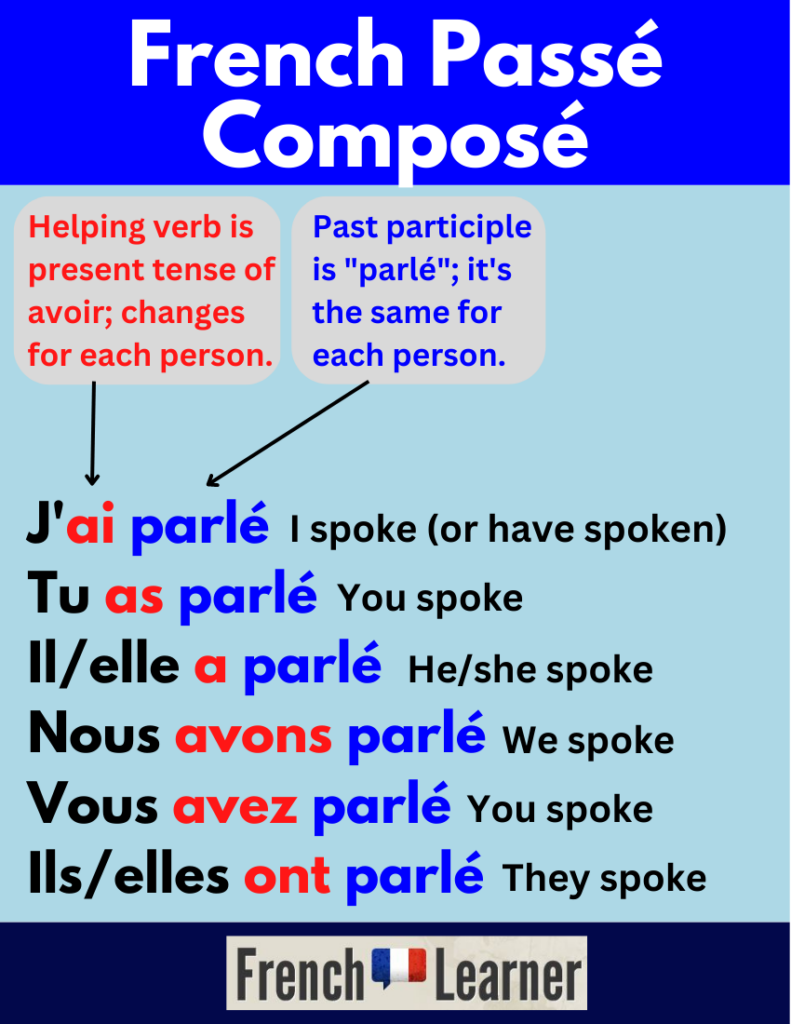
Negation rule for the passé composé
To negate the passé composé, wrap ne…pas around the helping (auxiliary) verb. Here are few example sentences. We have bolded the ne…pas.
- Nous n‘avons pas mangé. We have not eaten.
- Ils n‘ont pas dansé. They didn’t dance.
- Vous n‘avez pas voyagé. You have not traveled.

Passé composé for regular verbs
Regular -er verbs
To form the past participle for regular -er verbs, remove the -er on the infinitive (to form) of the verb and replace it with é. Hence:
parler -> parler -> parlé
Here are the regular -er verbs manger (to eat), travailler (to work) and habiter (to live) in the passé composé.
| manger j'ai mangé tu as mangé il, elle, on a mangé nous avons mangé vous avez mangé ils, elles ont mangé | travailler j'ai travaillé tu as travaillé il, elle, on a travaillé nous avons travaillé vous avez travaillé ils, elles ont travaillé | habiter j'ai habité tu as habité il, elle, on a habité nous avons habité vous avez habité ils, elles ont habité |
Regular -ir verbs
To form the past participle with regular -ir verbs, drop the -ir on the infinitive and replace it with -i.
finir (to finish) -> finir -> fini
Here are the regular -ir verbs choisir (to choose), réussir (to succeed) and obéir (to obey) in the passé composé:
| choisir j'ai choisi tu as choisi il, elle, on a choisi nous avons choisi vous avez choisi ils, elles ont choisi | réussir j'ai réussi tu as réussi il, elle, on a réussi nous avons réussi vous avez réussi ils, elles ont réussi | obéir j'ai obéi tu as obéi il, elle, on a obéi nous avons obéi vous avez obéi ils, elles ont obéi |
Regular -re verbs
To form the past participle for for regular -re verbs, drop the -re and replace it with -u.
vendre (to sell) -> vendre -> vendu
Here are some examples of regular -re verbs attendre (to wait), entendre (to hear), répondre (to reply, answer) in the passé composé .
| attendre j'ai attendu tu as attendu il, elle, on a attendu nous avons attendu vous avez attendu ils, elles ont attendu | entendre j'ai entendu tu as entendu il, elle, on a entendu nous avons entendu vous avez entendu ils, elles ont entendu | répondre j'ai répondu tu as répondu il, elle, on a répondu nous avons répondu vous avez répondu ils, elles ont répondu |
Here are some example sentences with regular verbs in the passé composé.
- Nous avons mangé la pizza. We at the pizza.
- Marie a fini son repas. Marie finished her meal.
- Georges a vendu la voiture. Georges sold the car.
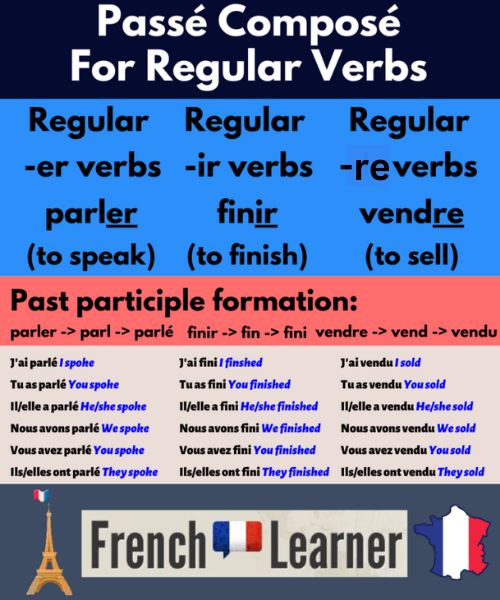
Irregular verbs in the passé composé
Irregular verbs have irregular past participles in the passé composé. The following is a list of commonly used irregular verbs and with their past participles.
Irregular past participles
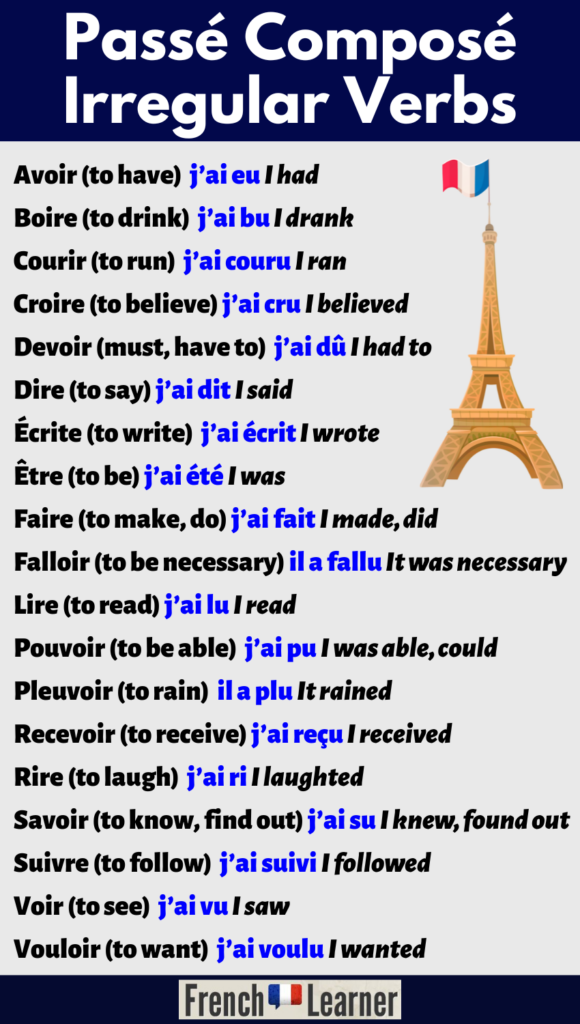
The following example sentences are formed with irregular verbs in the passé composé.
- J’ai lu le livre. I read the book.
- Pierre a fait un gâteau. Pierre made a cake.
- Martin a bu le café. Martin drank the coffee.
- Nous avons vu un film. We saw a movie.
Groups of irregular verbs in the passé composé
Groups of related irregular verbs share related past participles. For every irregular “base” verb in the following table you will find the past participles of related verbs.
| Base Verb | Past Participles | Related Verbs |
| mettre = to put | j'ai mis | comprendre (to understand) -> j'ai compris apprendre (to learn) -> j'ai appris surprendre (to surprise) -> j'ai surpris entreprendre (to undertake) -> j'ai entrepris |
| conduire = to drive | j'ai conduit | produire (to produce) -> j'ai produit construire (to build) -> j'ai construit détruire (to destroy) -> j'ai détruit |
| connaître = to know | j'ai connu | reconnaitre (to recognize) -> j'ai reconnu paraître (to seem, appear) -> j'ai parru apparaître (to appear) -> j'ai apparu |
| mettre = to put | j'ai mis | promettre (to promise) -> j'ai promis permettre (to allow) -> j'ai permis commetre (to commit) -> j'ai comis |
| craindre = to fear peidnre = to paint | j'ai craint j'ai peint | plaindre (to pity) -> j'ai plaint feindre (to pretend) -> j'ai feint teindre (to dye) -> j'ai teint |
To form the past pariciples for verbs ending in -rir, remove the -rir from the infintive and replace with -ert. For example:
- Ouvrir (to open) -> j’ai ouvert I opened
- Couvrir (to cover) -> j’ai couvert I covered
- Découvrir (to discover) -> j’ai découvert I discovered
- Souffrir (to suffer) -> j’ai souffert I suffered
Être verbs in the passé composé
In French, there is a list of seventeen verbs which take the auxiliary verb être (to be) in the passé composé. These tend to be verbs of movement.
In the previous section, all of there verbs which took the auxiliary verb avoir were transitive.
This means that the action of a verb is carried out onto an object. For example, “I eat pizza” becomes “I ate the the pizza” (j’ai mangé la pizza).
However, the following être verbs are intransitive, meaning that the action of the verb is not carried out onto any particular object. In essence, the subject and object are the same.
Detailed explanation:
I’m staying home. -> I’m not carrying out the action of staying onto anything else. I am both the subject and the object. I’m not doing anything to anything else.
Hence, Je reste chez moi (I stay home) becomes Je suis resté chez moi (I stayed home).
The following is aller (to go) in the passé composé.
The past participle of a a verb that uses être as an auxiliary verb in the passé composé must agree in gender and number with the subject.
There is an extra -e or -s is added to the past participle if the subject is feminine or plural.
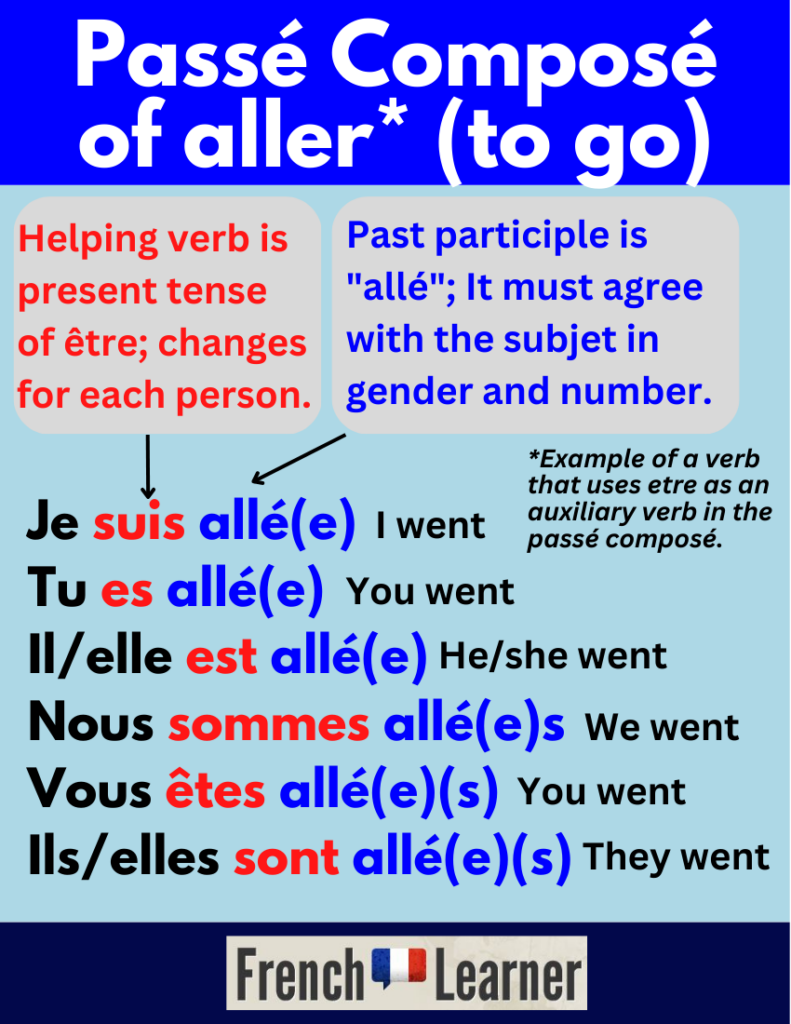
Dr. & Mrs. Vandertramp
A fun mnemonic device for memorizing the group of French verbs that are conjugated with être in the passé composé is called Dr. & Mrs. Vandertramp. These letters are the first letters of the list of verbs.
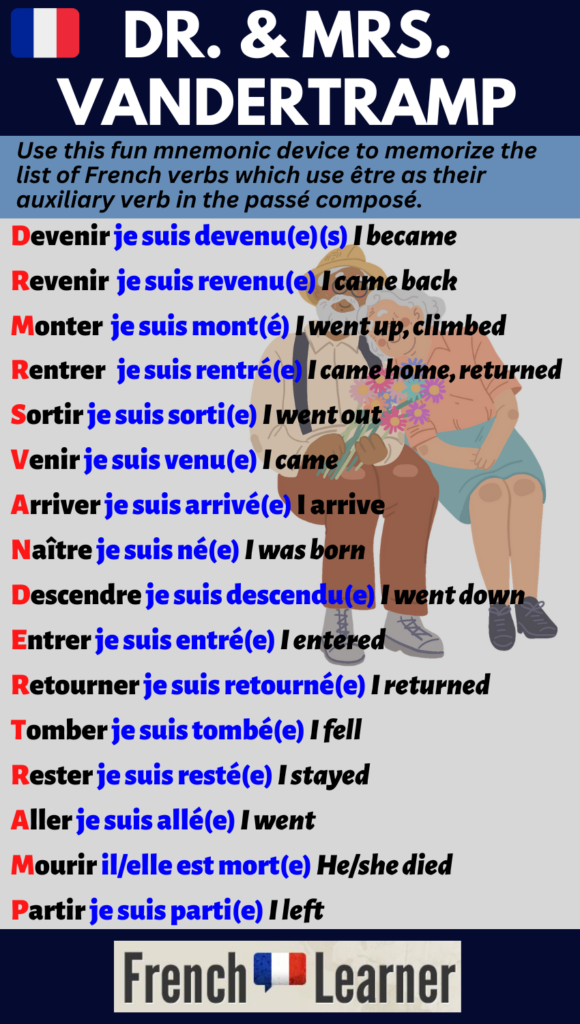
The following example sentences are verbs which require être as an auxiliary verb in the passé composé.
- Je suis rentré chez moi à 11h00. I returned home at 11 o’clock.
- Il est devenu très riche. He became very rich.
- Martin est monté la montagne. Martin climbed up the mountain.
Verbs which can take auxiliary verbs être and avoir
Some verbs take both être and avoir as auxiliary verbs. The difference is whether the verb is transitive (has a direct object and takes avoir) or intransitive (doesn’t have a direct object an thus takes être).
Passer = to pass by, spend time
- Je suis passé par la poste. I went by the post office.
- J’ai passé trois ans en France. I spent three years in France.
Sortir = to leave, to take out
- Je suis sorti de la maison. I left the house.
- J’ai sorti la poubelle. I took the trash out.
Monter = to climb, to take up
- Je suis monté la montagne. I climbed the mountain.
- Je suis monté la boîte dans le grenier. I brought the box up to the attic.
Descendre = to go down, take down
- Je suis descendu dans la cave. I went down to the basement.
- J’ai descendu la boîte dans la cave. I brought the box down to the basement.
My good friend, Camille, at Frenchtoday.com also provides an excellent post on the passé composé. In her post, Camille, provides crystal-clear grammatical explanations with lots super helpful example sentences.

